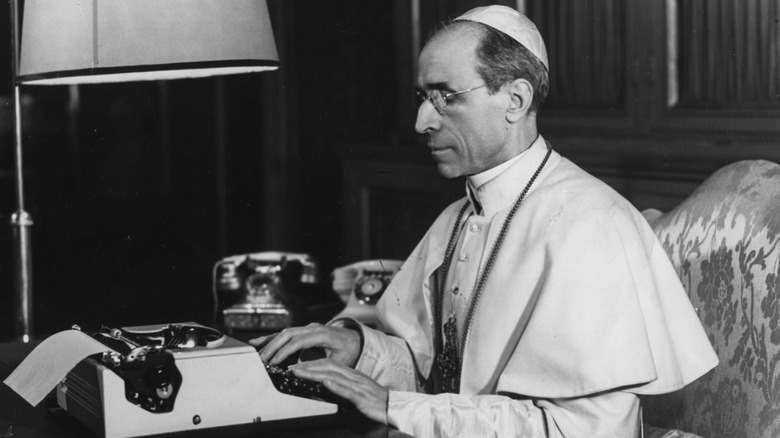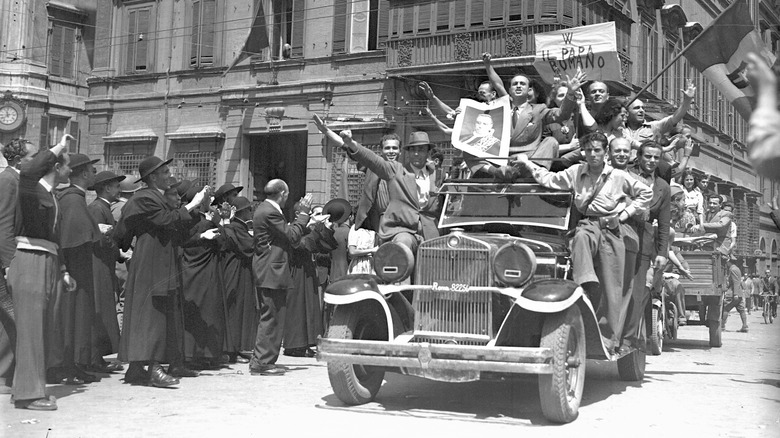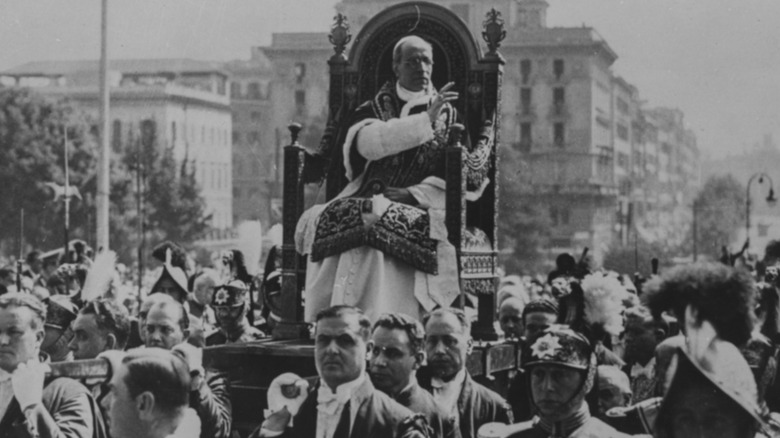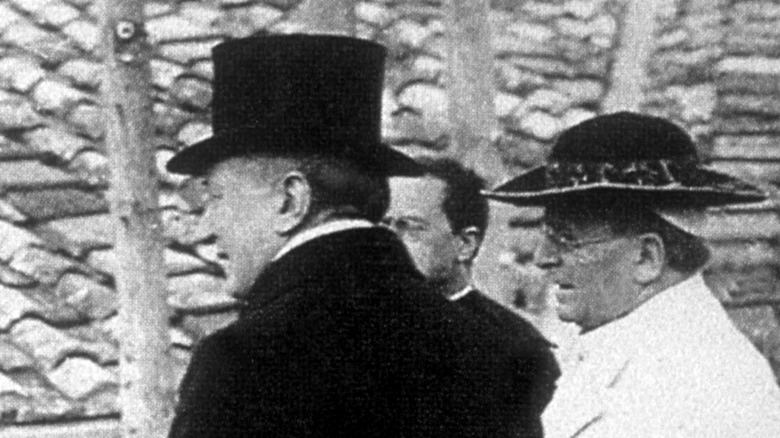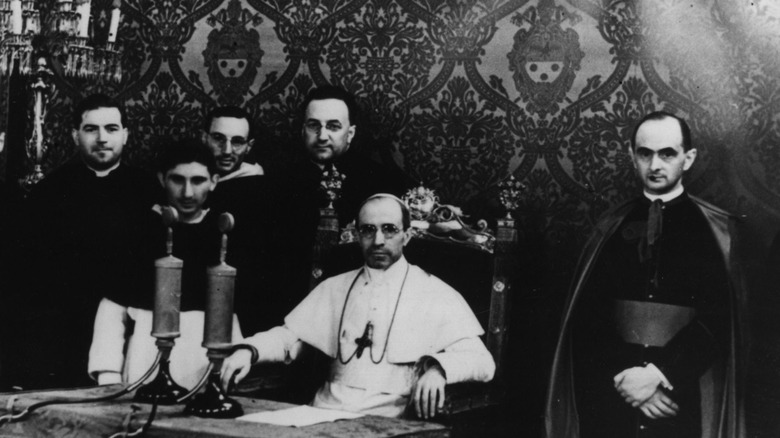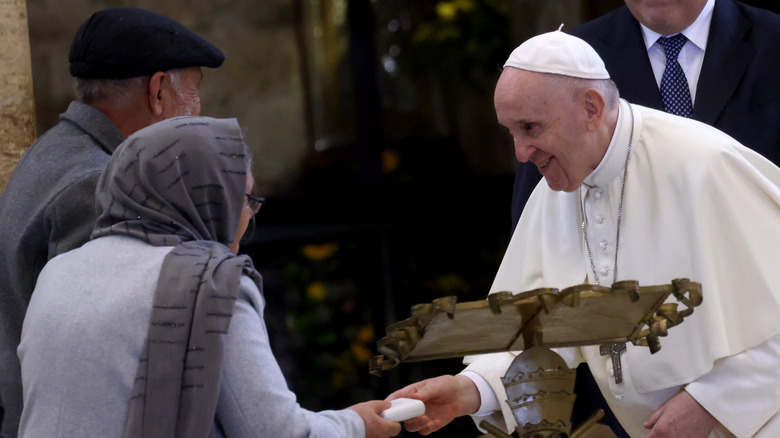Inside Pope Pius XII's Decree Against Communism
Pope Pius XII may be one of the most controversial popes in modern history. Born Eugenio Maria Giuseppe Giovanni Pacelli in 1876, Pius XII was head of the Catholic Church from 1939 until his death in 1958 (via Britannica). During his papacy, he was a key figure in World War II controversies, especially since the European seat of the Holy Roman Catholic Church remained "neutral" — certainly problematic by today's standards. Nazis considered him an ally yet, at times, such as in October 1943, the Pope worked actively to convert Jews to prevent them from being placed in concentration camps (via PBS).
In 2020, many Vatican documents were unsealed and amongst the thousands of pages of papal decrees, Pius XII's stance on communism as it pertained to Catholics emerged. Traditionally, papal papers are kept confidential until 70 years after the death of a church leader. However, just a few weeks before Covid-19 brought the world to a screeching halt, Pope Francis was excited to open the Vatican archives. He expressed that he was proud of the church's history, not afraid of it (via Smithsonian Magazine).
Pope Pius XII during World War II
Pius XII had some interesting visitors to the Vatican, including Queen Victoria's Nazi great-grandson, Prince Philipp von Hessen, who married Princess Mafalda of Savoy, the daughter of King Victor Emmanuel III of Italy (via PBS). Philipp von Hessen and his Nazi envoys come to the Vatican in order to discuss current affairs and parlay information between Hitler and the Pope.
As aforementioned, in October 1943, the SS arrived in Rome and arrested 1,260 Jews and held them for two days in a nearby military college. Under Pius XII, Vatican members worked diligently to show that some of them had been baptized as Catholic so that they could not all be shipped off as Jews to Germany. Under the direction of Pius XII, almost half of them were able to stay in Rome.
For this reason, some members of the Catholic church are hoping for his beatification so that he may be venerated as a saint. For Pius XII's role in World War II, current Pope Francis is in favor of his sainthood (via The Catholic News Agency.)
Changes to Catholic mass reflect changing world
According to The New York Times, the Catholic mass in the vernacular was permitted in the U.S. as of 1970. Previously, mass was conducted in Latin. Priests held knowledge of the Scriptures while the congregation was unable to discern the language. Conservative members of the clergy were furious by this form of modernized mass. Making Scripture more accessible seemed more in accordance with Martin Luther's ideals. Luther famously preached "Sola Scriptura" ("only Scripture") can unite one with God, which eliminated the need for the Holy Roman See. Catholics maintain Sacraments and intercessors in the form of priests must intercede between an individual and God (via Expositor Magazine).
Simultaneously, as Catholic doctrine was becoming more accessible, the theories of Karl Marx were gaining popularity. Marx considered himself an atheist and is famous for calling religion "the opiate of the masses," inferring it prevented people from rising up against unfair conditions (via The Cornell Chronicle). The church had much to lose if their parishioners cross-referenced Marx's beliefs with their own experiences and observations.
Pius XII scrutinized papal encyclicals (essays on modern issues as they apply to the church) of the mid to late 1800s. These encyclicals, such as "Quanta Cura" of 1864 and "Rerum novarum" of 1891, address the possibilities of uprisings against the Roman Catholic Church and the problems of the working class; a class becoming increasingly aware of Marxist ideology.
The clash of Communism and the Catholic Church
The Bolshevik Revolution that began in 1917 struck fear into the heart of the church. Catholic priests were stripped of the authority over their parishes and some were exiled. The Church was terrified to lose the faith of the Soviet people (via Loyola University).
In 1937, Pius XI (not to be confused with XII) issued an encyclical titled "Divini Redemptoris" (Latin for "Promise of a Divine Redeemer") (via The Vatican). In it he attacks intellectuals and communism, writing, "Ever since the days when groups of 'intellectuals' were formed in an arrogant attempt to free civilization from the bonds of morality and religion, Our Predecessors overtly and explicitly drew the attention of the world to the consequences of the dechristianization of human society."
He called out Mexico, Spain, and Russia for their uprisings. Interestingly, in his scathing missive, he only briefly references Scripture.
Pius XII issues a stern warning
As of 1946, almost 19% of the Italian population considered themselves communists while another 21% aligned themselves with the Italian Socialist Party. As half of the population of the country was seemingly leaning towards communist ideology but still remaining Catholic in at least the secular sense, the Vatican felt the need to issue a statement (via History of Yesterday). In 1949, Pope Pius XII approved a Latin text, titled "Decree Against Communism," in order to explicate the church's stance on this burgeoning philosophy.
The document, published in the Catholic press, was worded simply enough: church members who adhered to communist political beliefs were not able to partake in the sacraments of the Catholic Church. The document also shunned the reading or teaching of communist texts (via The Catholic Standard and Times). In short, anyone who adhered to such political doctrine would not be accepted by the church and be rejected by the community.
New popes usher in new attitudes
By 2013, Pope Francis was changing traditions of the Vatican (via The Atlantic). Francis is an admitted "anti-capitalist," not surprising considering his namesake, Saint Francis of Assisi, who espoused elevating the poor and keeping the church in a state of austerity. Considered more of a populist, Francis has written at least 200 pages against the capitalist markets of the United States and Europe, even invoking the use of the Reagan Era term "trickle down economics" as a negative term.
Pope Pius's successors, who include Pope John Paul II and Francis, have openly criticized the Church's anti-intellectual stance against communist thinking and have paved the way for a more open-minded church that challenges the ideals of capitalistic free markets.
With a flair for aesthetics much like his namesake, Argentine native Pope Francis stated (via The Atlantic), "While the earnings of a minority are growing exponentially, so too is the gap separating the majority from the prosperity enjoyed by those happy few... Consequently, they reject the right of states, charged with vigilance for the common good, to exercise any form of control. A new tyranny is thus born, invisible and often virtual, which unilaterally and relentlessly imposes its own laws and rules."
